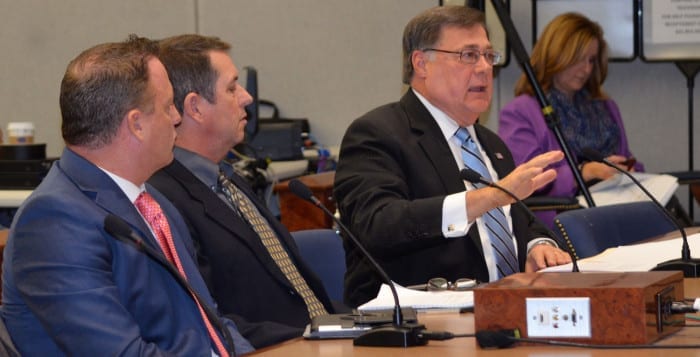Romaine speaks on illegal dumping and sand mining
Supervisor offers nine ways to strengthen and protect the aquifer

On Dec. 16, Supervisor Ed Romaine (R) testified at a New York State Assembly hearing on illegal sand mining and dumping, bringing to the forefront the threats that such actions pose to Long Island’s drinking water. Different from the rest of the state, Long Island is completely dependent on its sole source aquifer for drinking water, and the ecological and economic viability of the region is dependent on strong protections for this irreplaceable resource. At the hearing, state officials announced that they plan to release proposed regulations in February of 2016, including cradle-to-grave tracking of construction and demolition debris, that will help to stop illegal dumping.
In his testimony, Romaine said that the Town of Brookhaven worked with law enforcement agencies and took concrete steps to amend the Town Code in 2015 to allow more effective enforcement against illegal sand mining. He applauded the state’s proposal for stricter action and commented that it “must take on the complex task of tracking, monitoring and enforcing statutes that will stop illegal sand mining and illegal dumping on Long Island. The costs of inaction are extraordinary, because water treatment and cleanup of contaminants can easily cost billions of dollars in an area as large as Long Island.”
The supervisor also noted that the City of New York uses aerial patrols and watershed police to monitor activities near their reservoirs, and that they “could serve as a model for a Long Island NYSDEC unit dedicated to the protection of drinking water.”
He also made nine recommendations that will strengthen the protection of the aquifer.
The first involves upgrading misdemeanor illegal dumping charges to felonies, and the second, will upgrade illegal sand mining charges to felonies. Romaine also suggested improving legal definitions of sand mining and illegal dumping to make prosecutions easier, and requiring manifest logs for all materials being transported on or off individual sites. The fifth suggestion recommended substantially increasing the number of enforcement personnel. The sixth is creating a dedicated drinking water protection unit to focus on illegal dumping, illegal sand mining and other activities that threaten drinking water supplies. Romaine would also like to see improvements in the sharing of information and coordination between local government and enforcement agencies to curtail illegal sand mining and dumping. Another suggestion involves an increase in monitoring existing legal sand mines to ensure drinking water is protected and that sand mines are fully covered with suitable topsoil and revegetated. The final recommendation is the use of Natural Resource Damage Claims to force the reclamation and restoration of illegal sand mines.
In making the recommendations, Supervisor Romaine said, “I feel strongly that the protection of our water quality is of paramount importance for current and future Brookhaven residents … and I look forward to working … to make the penalties for illegal dumping and sand mining a strong deterrent to these activities,” he said. “We must make certain that all of the progress made to protect our drinking water and surface waters through the expenditure of millions of dollars to purchase open space and to build storm water abatement projects is not undone by allowing criminals to contaminate our water supply by the dumping of toxic waste. We must also ensure that the sand, which is the only natural filter for our drinking water, remains in place.”






